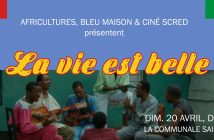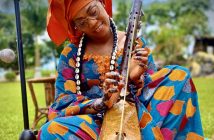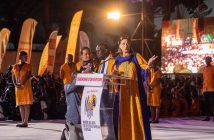What is the hit of this summer in Lagos ?
The biggest summer hit for now would be Dorobucci’ by artists on the Mavin Records label (Don Jazzy, Dr. Sid, Tiwa Savage, D’Prince et c.). It’s a dancehall song with lots of feel-good, self-praising lyrics. It’s loved mostly by the young and surprisingly by the elderly, who attend weddings where this song features regularly.
Which artist or group from your country is actually the most popular in Nigeria ?
The most popular artist at the moment is most likely Davido, with back-to-back hit songs and collaborations with local and international artists such as Phyno and Mafikizolo. He also recently won the BET award for Best International Act from Africa and has steadily gained fame since his breakthrough track Dami Duro’ was released in 2012. Like his contemporary Wizkid, his songs usually have catchy tunes and feel-good lyrics (usually about romance or boasting about their finances). Personally, though I don’t think he’s that good.
Are these artists successful only in Nigeria or have a wider impact ?
Many Nigerian musicians are popular all over the continent, and also amongst African diaspora crowds. The number of collaborations with other successful African and international acts attest to this. However, when it comes to where they perform, there is a bit of a problem: most of the big names in hip hop, R&B or dancehall perform mostly at parties or high-class events with expensive gate fees. Free or affordable concerts in warehouses, factories, rooftops, city centres or other such alternative spaces are rare in Nigeria. Artists like Wizkid, Asa, P-Square,Tuface, Davido, D’Banj and more, also perform regularly on international stages around the world.
What are the « underground » trends in terms of music in Nigeria?
There’s a lot of experimentation going on. I’m not sure how much of an underground trend I can call that because it’s also manifested in the mainstream and more popular acts. But these days, there are more indigenous-language rappers; singers with rock or neo-soul influences, and more cross-genre collaborations. Almost every new season, a new artist comes up and leaves you wondering, « Where’d that come from? How and where did s/he cook this up? » A club culture is steadily evolving as is beatboxing; Rather than producing club mixes from existing material, more DJs like DJs Xclusive and Spinall – are creating their own sounds these days with some delving into electronic music. It’s a growing fad in clubs nowadays to have creative, in-house DJs. The beatbox movement is still very much underground but could also explode soon especially given the introduction of local tournaments.
What was your latest musical discovery?
I’ve recently encountered the music of a dude named Patoranking. He recently released Girlie O’ and Alubarika’. There’s a Girlie O’remix featuring singer Tiwa Savage that is also quite good. As much as I tried not to like the song, it has grown on me possibly because its ragga-based. I haven’t listened much to its lyrics -it’s a love song like most other popular Nigerian hits – but the chorus has stayed in my head. Before him, I was intrigued by the lyrical power and musical delivery of Olamide, a wordsmith, who expresses himself via Yoruba rap.
What are the obstacles for a young artist currently in Nigeria?
Like most other aspiring artists across the arts, funding, publicity and distribution are the biggest obstacles. Funding and publicity, in the sense that up and coming artists need backers with enough money and clout to push their careers. This is not denying, of course, the fact that YouTube and music websites provide artists inexpensive platforms to present their work. These also mean that the public can then decide who becomes a star’, kind of like talent hunt shows do.
///Article N° : 12403












